- Home
- A P Bateman
Hunter Killer - Alex King Series 12 (2021) Page 12
Hunter Killer - Alex King Series 12 (2021) Read online
Page 12
King unwound his fingers and released her grip. He looked past her and wiped the window clear. “We’re here!” he said, a little too excitedly. His reaction sparked the interest of his fellow passengers, as he knew it would, and everyone started to shuffle closer to the windows, some picking up their coats and heading for the starboard deck.
Madeleine looked out of the window and said, “It really is a marvel.” She paused. “A wonder of engineering and resourcefulness…”
King nodded. “Come on, let’s get up on deck and take a closer look.” He did not give her any choice, heading for where he had hung his jacket. As he unhooked it, he knew the weight was off. He swung the jacket on like he was unaware and glanced around for a watching pair of eyes. The heavy little Makarov pistol was no longer there.
Chapter Twenty-Two
The sheer size of the first oil rig was remarkable. Four hundred feet high by some two-hundred and fifty feet wide and capable of withstanding one-hundred-foot waves as well as a twenty-knot collision from a five-thousand tonne vessel. There was a helicopter landing pad on the top deck and the drilling equipment had been removed and replaced by an experimental wind turbine which added another hundred and fifty feet in height. This turbine used a series of magnets to double the torque effect and generate four times the electricity as a standard wind turbine. As well as this, solar panel platforms had been attached around the second deck, jutting out a full hundred feet from the structure. The temperature may not have been warm, but clear skies generated enough power to work in tandem with the wind turbine and give the platform all the energy it would require, while a desalination plant provided an unlimited supply of fresh water. King had heard about the sustainability of the project, greenhouses and polytunnels made use of treated human excrement to fertilise the soil, and plants were heated and watered by an offshoot from the central heating system, providing sub-tropical growing conditions for tomatoes, herbs, salad leaves, strawberries, legumes, and potatoes. These plants were considered the easiest to grow in hothouse conditions, requiring just a few weeks from gestation to harvest. To compliment this self-sufficiency, weighted hook lines were lowered for a few hours a day using the waste remains of the previous day’s prepared catch and yielded daily hauls of cod, haddock and pollack to name but a few species of fish in plentiful supply, which were drawn to the molluscs and small fish that made the legs of the rig their home, which in essence was an artificial reef. Scraps of fish were also placed in crab pots and dropped to the seabed, where they would be hauled up every few days with a sizeable catch of crabs and lobsters.
“It’s enormous…” Madeleine said quietly. “You see there…” She pointed at a large boom jutting out several hundred metres. “That’s the hydroelectricity boom Aurora are testing. It remains deployed in the roughest weather, generating electricity twenty-four hours a day.”
King studied it, noticing the red flashing lights fitted along the top at intervals to warn shipping of its presence. The ship had slowed, the captain wary of the obstruction. Another boom connected with the neighbouring rig and in the lee of the rig, an identical boom jutted out several hundred metres. “Booms connect all the rigs as well in calm weather,” he replied. “And there’s seven of them in all…” He marvelled at the scale of the project. Seven out-dated oil rigs now used for the experimentation of hydroelectricity and regenerative power. King could see the nearest two rigs, both one-thousand metres equidistant, but the grey hue of the sky and matching greyness of the sea meant he could not see the other four rigs in the chain.
“These platforms could generate enough electricity to power London. That is, if it wasn’t being grounded on the buoy a mile south of here,” a voice behind King said. “Amazing, isn’t it?” King turned around and looked into the eyes of the man who had been on the beach watching Madeleine and Daniel. The man he’d had down as American, and CIA. “They just need governments to take on the technology, invest in similar projects.”
“But other companies need the technology, otherwise Aurora is a monopoly and that wouldn’t be fair on people. Sooner or later the tariff would go up and the supply chain could be affected.” King paused. “Who are you?” he asked, deciding not to beat around the bush and be direct.
“David Newman,” the man replied.
King stared at the man, a nagging feeling that he’d seen him before he had arrived in Svalbard. “What do you do?”
“I’m a salvage diver.”
“Small world.” King paused. “And what are America’s interests here?”
“Green energy,” Newman replied sardonically.
“From the country that pulled out of the Paris Accord, yet are the second largest polluter on the planet.”
“Another President’s policy. No, we’re all about the green these days.”
“In America’s case, the green usually means all about the dollar,” replied King. “Which is about right.”
Newman shrugged. “And you’re here because?”
“I’m helping Aurora salvage the submarine.”
Newman nodded. “Our paths may cross again, then.”
King looked at him, unsure whether their paths had already crossed. There was something vaguely familiar about the man, but he could not for the life of him remember where he had seen him before. He turned his back on him, confident that the man would not try anything here, and continued to look at the rigs, impressed not only by the size of a drilling platform up close, but the ambition of the project and the scale of the investment and organisation needed to bring it to fruition. He had read the articles in Forbes, National Geographic and USA Today about how Aurora had heard about Shell and BP’s issue of how to dispose of old drilling platforms in an environmentally friendly manner, and how the CEO of the new clean energy start-up had thought the opportunity too good to miss. Taking the rigs from them, the petroleum conglomerates had paid Aurora half what they would have spent scrapping them, and the irony that Aurora used these funds to further their clean energy ethos was not lost on the company’s investors.
King turned around and Newman was no longer behind him. Madeleine had pretended not to notice the curt exchange between the two men. King also thought it strange that she had not queried Daniel’s absence more. The ship had a manifest of passengers, but King suspected it would operate like a buddy system. They were grown adults and it wouldn’t be like a teacher holding a role call on the steps of the bus on a school outing. Daniel had only been in the company of Madeleine on Spitsbergen, so it would be likely only she would draw attention to his whereabouts.
The ship had moored alongside a large floating pontoon that jutted out some fifty metres and was tethered in place at the base of the platform. The pontoon looked to be constructed from a series of thick, hollow plastic containers chained together. Each section was around the size of the rear section of a small van, and the top surface had non-slip sheeting adhered in place.
“All constructed out of recycled plastic bottles with added natural colouring. The small sections make it more buoyant, but are also a safety feature, if one is damaged, the others remain afloat.” Madeleine said as they got in the orderly queue. She smiled up at him and added, “I did some reading up on it while I was on the plane. Speaking of which, where is Daniel? I still haven’t seen him.”
King pointed to the cage lift that was making its way up to the former drilling platform, the first passengers on their way to the top level, where the offices, accommodation and admin were located. He studied the lift and the queue and estimated that there would be another four or five trips before they got their turn. “I saw him get on board,” he lied. “I expect he’ll be putting first dibs on the best room.”
“Dibs?” She looked at him quizzically.
“Yeah, like calling shotgun.” He paused. “It’s a British thing.”
“Oh…” She watched the lift come back down and said, “I was told everybody gets off here then boats ferry them to the other platforms.”
“That’s
right,” King agreed. The formalities were a fog, the operation so rushed that it was all he could do to concentrate on what needed to be done next. He still needed to meet his contact. “So, Daniel may well be remaining on this platform. We’ll have to see how it works out, it could be us who get ferried away.”
“Oh well.” Madeleine bumped her hip against King’s and said quietly, “Three’s a crowd…”
King smiled down at her. His old mentor Peter Stewart, the man who had recruited and trained him what seemed like a lifetime ago, would always say, “You’re always in the shit, Son. It’s only the depth that varies…” King had begun to realise what the man had meant. There was no good outcome from allowing the flirtation and acknowledgement of the attraction between them. The shit level was about up to his bottom lip at this stage. He would have to be careful.
Chapter Twenty-Three
Lake Como, Italy
Located in a large basin within mountains giving way to numerous steep valleys through which funnelled wind met the water, Lake Como was renowned for its complex weather system. Often the lake could be seen dotted with masts and spray from sailing boats crashing through troughs, sails full and tacking dramatically tight courses, only for those same boats to be stranded in the middle of calm water, held hostage to still air and a mirrored surface from which there was often no escape for hours on end. There were few places on earth with such complex and fickle sailing conditions, and the locals even had names for the winds. There was the Breva - the prevailing wind, with its anticyclonic rotation it blew frequently. In the Alto Lago di Como, compared to the rest of the lake, the Breva wind was strengthened by an intensity that easily exceeded twenty-knots, accompanied often by significant wave motion. The Tivano was the morning thermal wind, with lower intensity. And the Ventone or Vento was the northerly wind that blows in strong gusts during the afternoons, often reaching forty knots. The Fohn was a wind that was accompanied by a rise in temperature, and the Garzeno or Garzenasco wind descended from the valleys of Garzeno and was usually associated with thunderstorms concentrated on the high ground above the town of Dongo.
Giuseppe Fortez did not tire of watching the lake and its turbulent waters. Since arriving here, he had noticed how the wind whipped up the lake, but how the conditions never lasted long, and as the days had warmed to spring, he could now set his watch by the change in wind and the daily temperature. There was little else for him to do here. Of course, he had been lucky to live through the takeover. What his grandfather had built up, the empire born from unions and workers’ rights had swelled to organised crime, wartime profiteering, switching of wartime allegiances and heavy-handed domination of the backstreets of towns and cities, and then entire regions of his beloved Italy. His father before him had commanded the regions of Tuscany and Umbria with the same ruthlessness as the Dons of Sicily but had remained out of the witch-hunts that had followed, paying off the right people and the wrong people with a little bit more. After he had succeeded his father Giuseppe Fortez had ruled with an iron fist, and had built a fortune, but in handing over the reins to his two sons, that fortune had been slowly eroded. Poor investments, battles with rival gangs and families, encroaching foreign organised crime and the reliance upon drugs and weapons as their stock-in-trade had weakened the family. The focus had changed, and his sons had forgotten the old ways. To intimidate and harm one’s enemies, rather than merely kill them meant that there was the chance for further extortion. Yes, the previous generations of Fortez men had killed, but to kill too soon was to close an account, a line of opportunity. His sons had also failed to invest in gold. The precious metal was the true measure of one’s wealth and governments the world over used it to value their currency. Instead, his sons had used Bitcoin and invested in dot com companies that had subsequently folded. They saw their father’s reluctance to change his ways as a failing, but in truth, he had remained with the tried and tested methods. Giuseppe Fortez had resisted investments in stocks and settled only on gold, because everything else in life was a risk that was only profitable for as long as the smart money remained invested. But gold was gold and since the ancient civilisations had dug up the first nuggets, the value and desire has never satiated. But of all things it was their involvement in drugs that had been the beginning of the end. Drugs created stiff and ruthless competition, holes in the supply chain, informers and undercover police, junkies who would sell out their own mother for a fix.
Giuseppe watched the boats tacking back and forth across the water. His villa was located on top of a fifty-foot cliff and surrounded by three acres of gardens. He had more bedrooms than he needed and had managed to negotiate his classic Alfa Romeo Spyder and Mercedes S-class, but his son Gennaro’s vehicles had been shared among the Marino family, as had every remaining asset. Giuseppe had the money he had kept away from his sons in Switzerland, as well as some physical gold bullion in Liechtenstein, classed as offshore investment. The fact that the head of the Marino family allowed Fortez to live and relocate to Lake Como was not lost on him every day. The act may have been seen as weak by some, but Marino used it as testament to his victory. Fortez was a prisoner, a reminder that Marino could have killed him, but had allowed him to run away like a coward instead. The Fortez family dynasty had been ended, and the figurehead now rested in abject poverty, his business and assets carved up and his son’s wives and children cast to the streets with nothing. And there was nothing Giuseppe Fortez could do about it. A stipulation. The price for his life. And to his consternation, he had accepted those terms. However, what he hated most, more than the sad reflection of his wrinkled face as he shaved in the mirror each morning, more than the loss of his family home and the sight and sound his grandchildren running around the terraces, was the Englishman Alex King. The bastard from MI5 who had used his son Luca merely to get to their Russian mafia rivals and had left his son to his fate. The man who had killed his younger son Gennaro in Britain last year. Shot him as he had fled in a light aircraft. He knew that his son had disregarded his own orders, gone to search for the man who had killed his brother, but he could not sit back and leave his sons unavenged. It was not the Italian way, and it was not the Fortez way. He may have lost everything including his dignity, but he was damned if he was going to lose both of his sons and leave their killer walking the earth.
Giuseppe Fortez moved his chair a few inches and felt the sun on his face once again. Like a cat tracking the sun across the floor, ever escaping the shadows. The light across the lake had cast a golden hue on the surface, and a sailing boat had a full sail and was sailing the length of reflective gold, its stern glistening in the sunlight. Fortez reached for his espresso and tested the liquid. It had cooled slightly, and he drank it down, savouring the caffeine hit and with it the thought of having the English assassin killed, but not before his killer delivered him a message, leaving him in no uncertain terms who was behind his execution.
Chapter Twenty-Four
North Atlantic
Keshmiri Pezhman kept his eyes to the periscope and watched the frigate two-thousand metres to the east. It was an Irish Naval Service vessel running close to Scottish waters, two hundred miles north of Ireland, and as he watched, it turned hard to port and headed towards them. Pezhman gave the order to dive as he dropped periscope. The frigate could have detected their presence, or it could have been a chance manoeuvre, but his objective was to avoid contact at all costs and complete his mission.
The helmsman controlled the plane, while the ballast tanks filled with water and the boat propelled steadily downwards. The crew leaned back in unison as the vessel tilted forwards and headed for a depth of three-hundred feet. They had been making twenty knots, or twenty-three mph. But the Iranian Commander gave the order to slow until the Irish Navy frigate was clear of them. The submarine couldn’t run silently at speed. They had enough fuel and supplies to run for thirty-five days, but it would take just two more to reach their objective. The air scrubbers had been cleaned and vented at the last refuel
stop and they could carry out their mission and escape through the Northern Sea Route and the Bering Strait, where an Indian registered tanker now under North Korean ownership and crew, and skirting the trade sanctions, would meet to resupply them and exchange cargoes south of the Andreanof Islands. Their journey should take no more than twenty days. Another twenty and they would return to Iran as heroes. And Iran would have no reason to fear its enemies again, and its enemies would quake in its shadow. A new world order was possible. With riots on American streets, democracy proven to be a myth as half the US felt cheated and disillusioned in recent years, Iran and its allies would grow stronger, while the great Satan that was America grew weaker and frequently less vigilant. The submarine commander smiled at the thought. The scales would soon balance in Iran’s, and the Great Ayatollah’s favour.
Chapter Twenty-Five
500 miles north of Svalbard Archipelago
Beneath the Polar Icecap
Commander JT McClure gave the order for silent running. No crew member other than the two helmsmen and the sonar operator, along with his second in command (XO) and the Weapons Division Officer (WEPS) could speak. And even then, anything but a low tone a quiet voice was a court-martial offence. All crew members were frozen in their spots. Above them, just eighty-feet of water between the conning tower and the first of the dramatic polar stalactites and a steady eight-foot thickness of solid polar icecap. Just one-hundred feet below their hull, the Russian submarine was suspended in eleven-thousand feet of water, at a steady eight-knots.

 Stormbound
Stormbound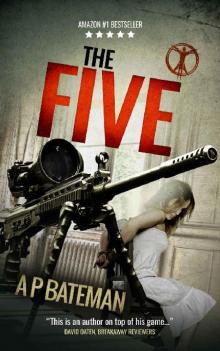 The Five
The Five The Alex King Series
The Alex King Series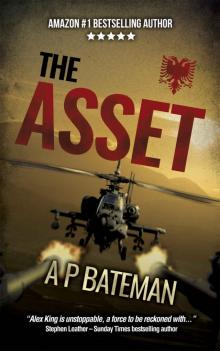 The Asset (Alex King Book 10)
The Asset (Alex King Book 10)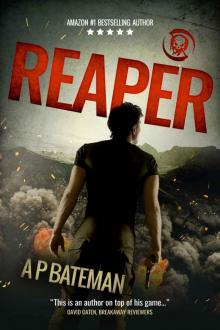 Reaper
Reaper Breakout
Breakout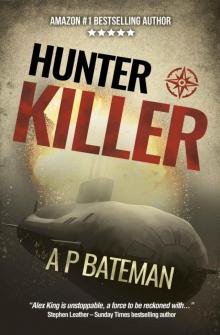 Hunter Killer - Alex King Series 12 (2021)
Hunter Killer - Alex King Series 12 (2021) The Town (Rob Stone Book 2)
The Town (Rob Stone Book 2)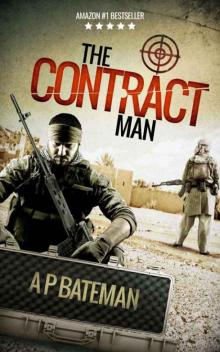 The Contract Man
The Contract Man The Island (Rob Stone Book 3)
The Island (Rob Stone Book 3)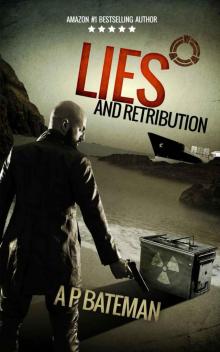 Lies and Retribution (Alex King Book 2)
Lies and Retribution (Alex King Book 2) Shadows of Good Friday (Alex King Book 3)
Shadows of Good Friday (Alex King Book 3) The Ares Virus
The Ares Virus